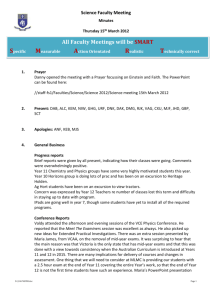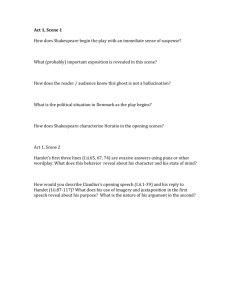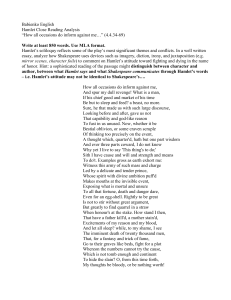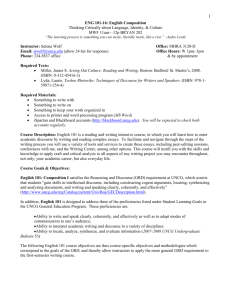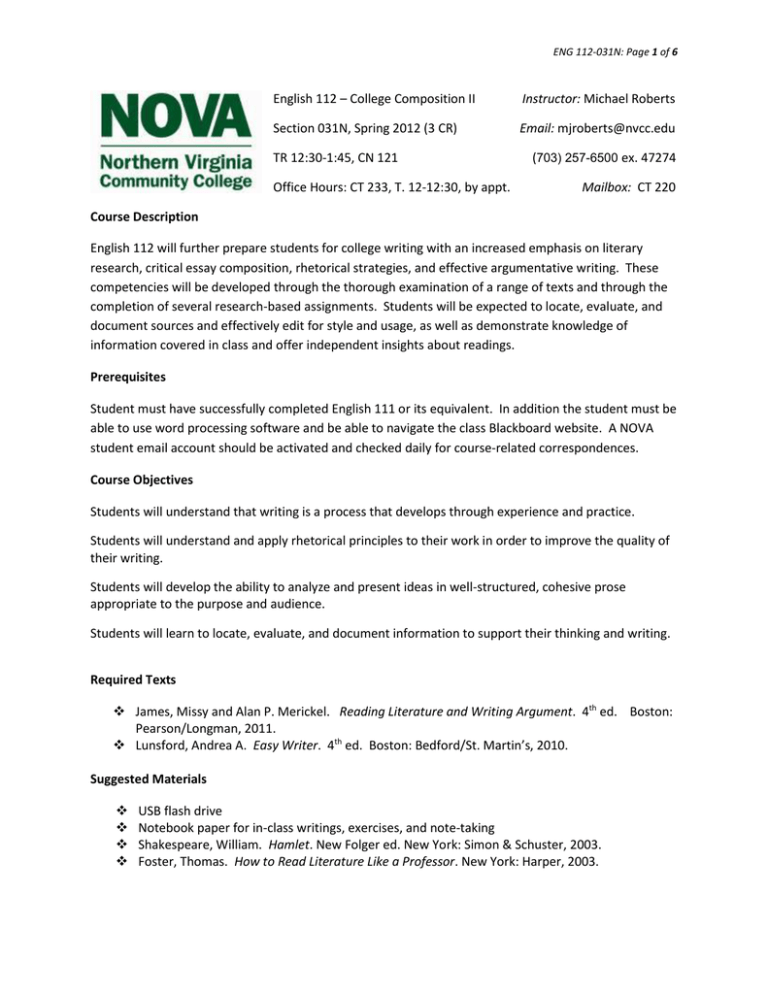
ENG 112-031N: Page 1 of 6
English 112 – College Composition II
Instructor: Michael Roberts
Section 031N, Spring 2012 (3 CR)
Email: mjroberts@nvcc.edu
TR 12:30-1:45, CN 121
Office Hours: CT 233, T. 12-12:30, by appt.
(703) 257-6500 ex. 47274
Mailbox: CT 220
Course Description
English 112 will further prepare students for college writing with an increased emphasis on literary
research, critical essay composition, rhetorical strategies, and effective argumentative writing. These
competencies will be developed through the thorough examination of a range of texts and through the
completion of several research-based assignments. Students will be expected to locate, evaluate, and
document sources and effectively edit for style and usage, as well as demonstrate knowledge of
information covered in class and offer independent insights about readings.
Prerequisites
Student must have successfully completed English 111 or its equivalent. In addition the student must be
able to use word processing software and be able to navigate the class Blackboard website. A NOVA
student email account should be activated and checked daily for course-related correspondences.
Course Objectives
Students will understand that writing is a process that develops through experience and practice.
Students will understand and apply rhetorical principles to their work in order to improve the quality of
their writing.
Students will develop the ability to analyze and present ideas in well-structured, cohesive prose
appropriate to the purpose and audience.
Students will learn to locate, evaluate, and document information to support their thinking and writing.
Required Texts
James, Missy and Alan P. Merickel. Reading Literature and Writing Argument. 4th ed. Boston:
Pearson/Longman, 2011.
Lunsford, Andrea A. Easy Writer. 4th ed. Boston: Bedford/St. Martin’s, 2010.
Suggested Materials
USB flash drive
Notebook paper for in-class writings, exercises, and note-taking
Shakespeare, William. Hamlet. New Folger ed. New York: Simon & Schuster, 2003.
Foster, Thomas. How to Read Literature Like a Professor. New York: Harper, 2003.
ENG 112-031N: Page 2 of 6
Grading Policy
First Essay (850 words)
15%
Revision of the First Essay
10%
Second Essay (1000 words)
15%
C 70-79%
Third Essay (1000 words)
20%
D 60-69%
A 90-100%
B 80-89%
F 0-59%
Final Exam
15%
Quizzes and Written Prompts
10%
Discussion Board and Participation
15%
Paper Requirements
All papers must be completed using word processing software in 12-point Calibri or Times New Roman
font, one inch margins, and contain proper MLA documentation and formatting. Papers should be
double-spaced and contain your name, course number, date, and paper number in the upper left
corner. A “Works Cited” page will be required for the final paper and should include three to five
secondary sources. Grades will be determined on a 50% mechanics and 50% content scale. Papers are
to be submitted as hard copies to the instructor when called for on the day they are due (ExceptionPaper #3). Electronic copies will only be accepted with prior approval from the instructor.
Late Papers and Missed Quizzes
*Late papers will be marked down one full grade for each day late. After three days have elapsed the
paper will not be accepted. Any missed quizzes or classwork cannot be made up.*
Deadlines are important, in this course as well as in life. Papers are to be submitted before class on the
day they are due. Lateness penalties will be reduced if extenuating circumstances are discussed with the
instructor prior to the due date. The Student’s lowest quiz grade will be dropped at the end of the
semester.
Essay Revisions
A revision of the first essay is due approximately one week after papers are returned. Students are
strongly encouraged to schedule an appointment with the on-campus Reading/Writing Center located in
CG 409 (ext. 2-3341).
Policy of Academic Honesty and Integrity
Academic dishonesty is unacceptable. The first time a student submits an assignment demonstrating
evidence of academic dishonesty, he or she will receive a grade of “0” on the assignment and have his or
her name recorded in a department database. Any student who is found to have committed a second
ENG 112-031N: Page 3 of 6
act of academic dishonesty will fail the course in which the instance occurred and may be referred to
Ray Jones in the Office of Student Conduct.
According to the Student Handbook, academic dishonesty includes, but is not limited to, cheating on an
assignment by giving, receiving or soliciting information or using unauthorized materials; obtaining or
distributing material purported to be on an upcoming assignment; substituting on an examination for
another person, plagiarism; collusion with another person on an assignment; and knowingly furnishing
false information to the college.
In classes such as this one, the most common form of academic dishonesty is plagiarism. Plagiarism is
any act wherein you do not properly acknowledge the thoughts or words of another or attempt to
present those thoughts or words as your own. Please note that this includes failing to submit a works
cited page with your assignment or even accidentally forgetting in-text citations or quotation marks.
All work should be independently produced by you for this specific course without outside
assistance. Collusion, or working with another person in the preparation or editing of assignments
submitted for credit, is also unacceptable, unless such collaboration has been specifically approved in
advance by me. In this course, you may only use the academic support services provided by NOVA to
get additional assistance on your assignments. If you have questions about what constitutes academic
dishonesty, please discuss it with your professor before you submit your assignment. This course may
make use of SafeAssign, a plagiarism prevention service, to detect unoriginal content in student papers.
Class Participation / Conduct
Class participation accounts for a large portion (15%) of the student’s final grade. While attendance is
mandatory, this category also includes being an active class member, taking notes, offering insights, and
asking questions. In-class exercises, group work, attendance, and the submittal of paper theses are all
factored into the student’s class participation grade. There will be opportunities to lead a class
discussion for additional participation points in which you will be responsible for coming prepared with
2-3 questions to help prompt class discussion and 2-3 specific areas or observations in the text to which
you would like to draw the attention of the class.
The use of cell phones or other electronic devices is not allowed once class is in session. Laptops are
allowed for note-taking purposes only; if other students are distracted by what appears on your screen
the instructor reserves the right to ask you to remove your computer from class. To be a member of this
class you agree to not engage in aggressive behavior, make comments during class or electronically that
are derogatory, insensitive, or rude, and to not engage in disruptive side conversations during class.
Failure to comply will result in being asked to cease disruptive behavior, depart class, and be referred to
the dean of students and/or campus police. *All discussion board postings and Email correspondences
should use standard written English and be regarded as respectful, professional exchanges between you,
your peers and the instructor.
Important Dates
Add/Drop on NOVAConnect with tuition refund
January 9-26
ENG 112-031N: Page 4 of 6
Martin Luther King Jr. Holiday
January 16
**Last day to drop with tuition refund (Census Date) **
January 26
Spring Break/ no classes
March 5-11
**Last day to withdraw without grade penalty**
March 23
Last week of classes
April 24-30
Final exam week
May 1-7
Examinations end
May 7
Course Withdrawal Policy
Students failing to attend the first four class meetings (i.e. the first two weeks) will be automatically
dropped from the course. You may voluntarily withdraw from the course and receive a grade of “W” no
later than March 23, 2012. Following this date you will receive an “F” since it is your responsibility to
withdraw.
Class Attendance
Regular and prompt class attendance is expected of every student. A good deal of discussion and work
will take place during each class and cannot be made up.
*5 or more absences will result in a 10% reduction of the student’s final grade. 7 or more absences will
result in an automatic “F” for the course. Repeatedly arriving late (3+ minutes) or leaving early
constitutes ½ of an absence.*
If extenuating factors such as illness or a family emergency arise, notify the instructor as soon as
possible to arrange potential accommodations. Be aware of the 60 percent date for each class in case
you need to withdraw for any reason (see “Important Dates”).
Disability Statement
Students with disabilities may be eligible for accommodations in their classes. If you are a student with
a disability you may wish to contact a Counselor for Disability Services in CG 211.
Snow Policy
In the event of a campus closing due to inclement weather look to receive an electronic correspondence
from the instructor via Blackboard to your NVCC student email account. The due dates for assigned
readings and assignments will not deviate from the syllabus unless otherwise noted by the instructor.
Evacuation Statement
In case of emergency, please follow the emergency procedure as discussed on the first day of class and
posted in the classroom.
ENG 112-031N: Page 5 of 6
Tentative Schedule of Assignments
T January 10
R January 12
T January 17
R January 19
T January 24
R January 26
*T January 31
R February 2
T February 7
*R February 9
T February 14
R February 16
T February 21
R February 23
Preliminaries- Syllabus Review, Using Blackboard
Due- Set up and check your NOVA email and BB
account for a class correspondence
EW- Analyzing an Argument (25-38)
BB- George Orwell “Shooting an Elephant”
In-Class- Reading and Writing about Essays
RL- Literature and Argument (1-5) Pathos, Ethos, Logos
(27-8) Examining and Analyzing Argument (12-17)
RL- Martin Luther King, Jr. “Letter from Birmingham
Jail” (212-23)
EW- The Writing Process (12-17), MLA Style (206-214)
RL- Kate Chopin “The Storm” (394-7)
RL- Kate Chopin “Desiree’s Baby” (98-102)
EW- Writing About Texts (17-25)
RL- Louise Erdrich “The Red Convertible” (111-17)
RL- Jack London “To Build a Fire” (294-305)
EW- Conciseness in Writing (98-104) Writing to the
World (142-47)
RL- Tim O’Brien “The Things They Carried” (539-51)
In-Class- Peer Editing: bring a copy of Essay #1 to class
Due- Paper #1: Tactics of Argument (3-5pp.)
BB- Ray Bradbury “There Will Come Soft Rains”
BB- Gabriel Garcia Marquez “A Very Old Man with
Enormous Wings”
BB- Shirley Jackson “The Lottery”
RfW- Making Revisions (27-31)
BB- Ursula K. Le Guinn “The Ones Who Walk Away from
Omelas”
Due- Revision of Paper #1
BB- excerpts from Sigmund Freud’s “The Uncanny”
BB- Charlotte Perkins Gilman “The Yellow Wallpaper”
RL- Eudora Welty “A Worn Path” (309-15)
BB- Sarah Orne Jewett “A White Heron”
Read Online- James Baldwin “Sonny’s Blues”
<http://www.scribd.com/doc/7086554/Sonnys-Bluesby-James-Baldwin>
RL- Raymond Carver “Cathedral” (513-23)
In-Class- Guest Lecture (?) Professor Andrew Cooper
Elements of Poetry
BB- skim “Glossary of Poetic Terms”
BB- Bring a copy of “Additional Poems to Study”
- Billy Collins “Introduction to Poetry”
RL- Wilfred Owen “Dulce et Decorum Est” (34-5)
In Class- Elements of Poetry continued
ENG 112-031N: Page 6 of 6
R March 1
T,R March 6, 8
T March 13
R March 15
T March 20
R March 22
T March 27
R March 29
T April 3
R April 5
T April 10
R April 12
*T April 17
R April 19
T April 24
R April 26
*F April 27
*T May 1
M May 7
BB- Bring a copy of “Additional Poems to Study”
- John Donne “The Flea”
RL- William Shakespeare “Sonnet 130” (31)
RL- Robert Frost “Mending Wall” (583-4)
RL- T.S. Eliot “The Love Song of J. Alfred Prufrock” (176)
*No Class – Spring Break
RL- Logical Fallacies (18-19)
RL- Robert Hayden “Those Winter Sundays” (34)
RL- Langston Hughes “Theme for English B” (585-6)
RL- William Stafford “Travelling Through the Dark”
(338)
RL- Linda Pastan “Ethics” (592-3)
Due- Paper #2: Argumentative (3-5pp.)
In-Class- Poetry TBA, Reading and Writing about Plays
*Tom.= Last day to withdrawal without grade penalty*
BB- Susan Glaspell “Trifles”
RL- Jane Martin “Rodeo” (9-11)
BB- David Ives “Sure Thing”
In Class- A Note on the Elizabethan Theatre
Reading TBA
(Potential class cancellation: instructor out-of-town)
Hamlet online:
< http://shakespeare.mit.edu/hamlet/>
BB- William Shakespeare Hamlet Act I
BB- William Shakespeare Hamlet Act II
BB- William Shakespeare Hamlet Act III
BB- William Shakespeare Hamlet Act IV-V
Due- Paper #3 Thesis (In Class)
BB- William Shakespeare Hamlet Act V
In Class- Excerpts from K. Branagh’s film of Hamlet
EW- Conducting Research (176-82) Writing a Research
Project (202-4)
*Library Visit: Research Resources at NOVA
NVCC Last Week of Classes
EW- Evaluating Sources (184-97)
EW- Review: Writing MLA Papers (206-14) (245-52)
EW- Skim: MLA Works Cited (214-45)
Due- MLA Quiz (in class)
In Class- Course Evaluations
In Class- Peer Editing: Bring a Copy of Paper #3 to Class
Final Exam Questions/Discussion
Due Electronically, before midnight- Paper #3:
Argumentative w/ 3-5 outside sources (5-7pp.)
<mjroberts@nvcc.edu>
FINAL EXAM: *12:00-1:50*
NVCC Last Day of Examinations



